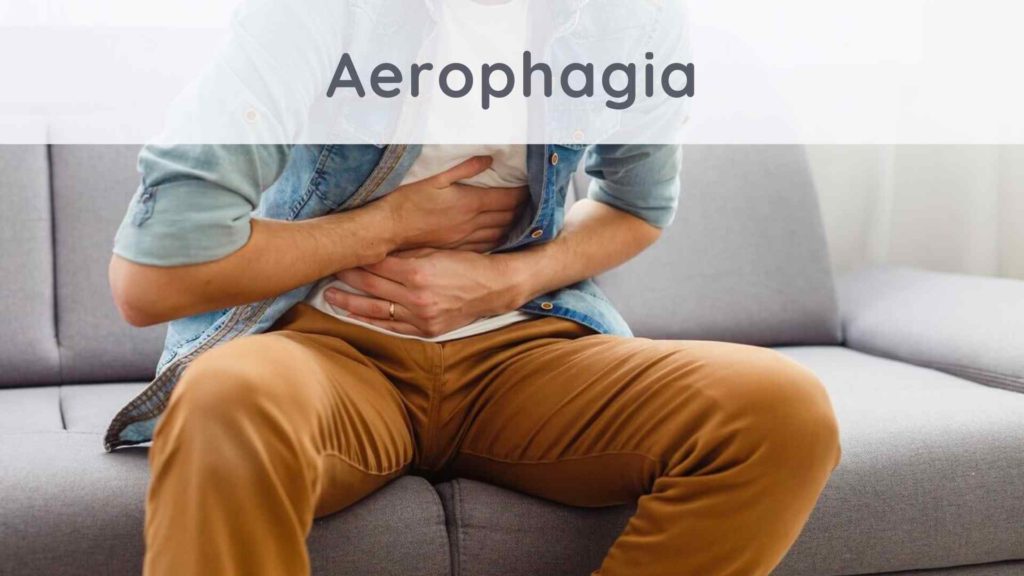Aerophagia: how to relieve yourself naturally?
Written by: Loris Vitry (holistic coach)
Validated by: Cathy Maillot (Osteopath)
Caution: If you have any medical questions or concerns, please speak to your doctor. Even if the articles on this site are based on scientific studies, they do not replace professional medical advice, diagnosis or treatment.

Aerophagia is an intestinal disorder that affects thousands of people around the world.
It manifests itself more, particularly in adults.
Several simple hygienic-dietetic measures can be implemented to relieve aerophagia.
In addition to these measures, herbal solutions can be of great help.
Read this article to discover the natural ways to treat aerophagia.
Symptoms and causes of aerophagia
When you eat or drink, you swallow excess air from your digestive tract, which is the leading cause of aerophagia.
It causes discomfort, flatulence, and rotting that is harmless, but can get worse and be accompanied by abdominal spasms, chest pain, heartburn, or diarrhea.
Various factors can be the basis of aerophagia.
Among others, we can cite the following causes.
- Modification of the bacterial flora following antibiotic treatment.These treatments can increase gas production in the digestive tract.
- Excessive consumption of fats or legumes (chickpeas, onions, etc.).
- Regular consumption of alcohol, soft drinks or chewing gum.
- when stools stay too long in the intestines, it induces fermentation and increase the quantity of gas in the digestive tract.
- Anxiety and stress make people swallow air more frequently than average.
There is also a significant intake of air when talking, drinking, or gulping a bit or when talking while eating.
Indeed, approximately 2 to 3 ml of air are ingested with each swallowing, meaning 2 to 4 liters of air swallowed per day.
Only 500 ml of gas can be stored in the digestive tract, and the vast majority goes in the colon.
So, when the amount of air ingested exceeds 4 liters, the excess must be eliminated in the form of flatulence and belching.
In cases where the gas cannot be evacuated, it causes bloating or abdominal pain.
Hygienic-dietary measures to relieve aerophagia
To reduce aerophagia in the long run, you need to improve your lifestyle and your diet, observing the following tips can help you.
Avoid stress
Aerophagia is most often caused by stress and anxiety.
Therefore it is necessary to find the cause of the stress and eliminate it.
Stress management avoids aerophagia crises that could, in return, increase your nervousness.
Eat and chew food gently and slowly
We all tend not to give any attention while eating, and we allow a large amount of air to be sent into the digestive tract due to bad habits.
We often don’t chew enough by eating too quickly, which gives the body more work during digestion and induces the ingestion of more air.
The best way to avoid this is to sit still and calm, to eat slowly and to chew the meal properly.
Do not speak while eating
When you speak while eating, it causes the ingestion of a lot of air in the digestive tract.
So you need to eat calmly and your mouth shut to reduce these amounts of air intake.
Reduce consumption of soft drinks, chewing gum, tobacco, alcohol, and coffee
Chewing gum and soft drinks are full of air, making them additional sources of air.
It is, therefore, better to consume plain water immediately after a meal.
Tobacco, alcohol, and coffee are stimulants that worsen aerophagia, so they should be avoided.
Banning the consumption of these foods helps reduce the amount of air in the digestive tract.
Natural solutions to aerophagia
You can treat aerophagia by using complementary natural solutions.
Good food
One of the leading causes of your aerophagia is certain types of food.
The most suitable solution is to go to a naturopath to receive nutritional advice that will be adapted to you.
Aerophagia and stress
If the cause of your aerophagia is stress, you will have to take relaxing approaches such as:
- yoga to relax your body and nerves through meditation,
- martial arts like taï-chi-chuan and ki-gong for good self-control,
- osteopathy that will help you fight stress and also regulate your digestion by tackling the problems at the root.
Homeopathy
Homeopathy helps treat the various symptoms of aerophagia.
So, depending on the symptoms, you can use one of these solutions.
- Carbo vegetabilis 9 CH to treat bloating after meals.
- Asa foetida 9 CH to treat the impossibility of burping and the feeling of bloated stomach.
- Lycopodium 9 CH to treat bloating that arises in the afternoon.
- Ignatia 9 CH to treat aerophagia attacks caused by stress.
Each of these different homeopathic solutions is taken according to a specific dosage, but in general, the recommended amount is 5 granules.
Phytotherapy
Aromatic plants have also been shown to be effective against this disease, like the following plants:
- star anise that prevents aerophagia
- caraway which helps in digestion
- peppermint that helps improve stomach functions
- the liveche fights bloating
- basil fights stress.
So after meals, all you need to do is infuse these plants and consume the hot infusion to prevent and treat aerophagia.
Aromatherapy
Essential oils also represent an excellent solution against aerophagia.
You can use either basil, dill or rosemary essential oil with honey, cardamom essential oil in vegetable oil or you can diffuse basil essential oil, dill or sweet tangerine in the rooms where you stay most often.
In short, aerophagia is an unpleasant disorder manifested by flatulence and burping.
Foodborne or stress can cause aerophagia.
But natural remedies such as aromatherapy or phytotherapy can help to reduce or eliminate it.
However, when the situation does not improve, it is recommended to consult a health specialist to find a more suitable solution.
Continue reading:
Alpha male: how to become an alpha man?

